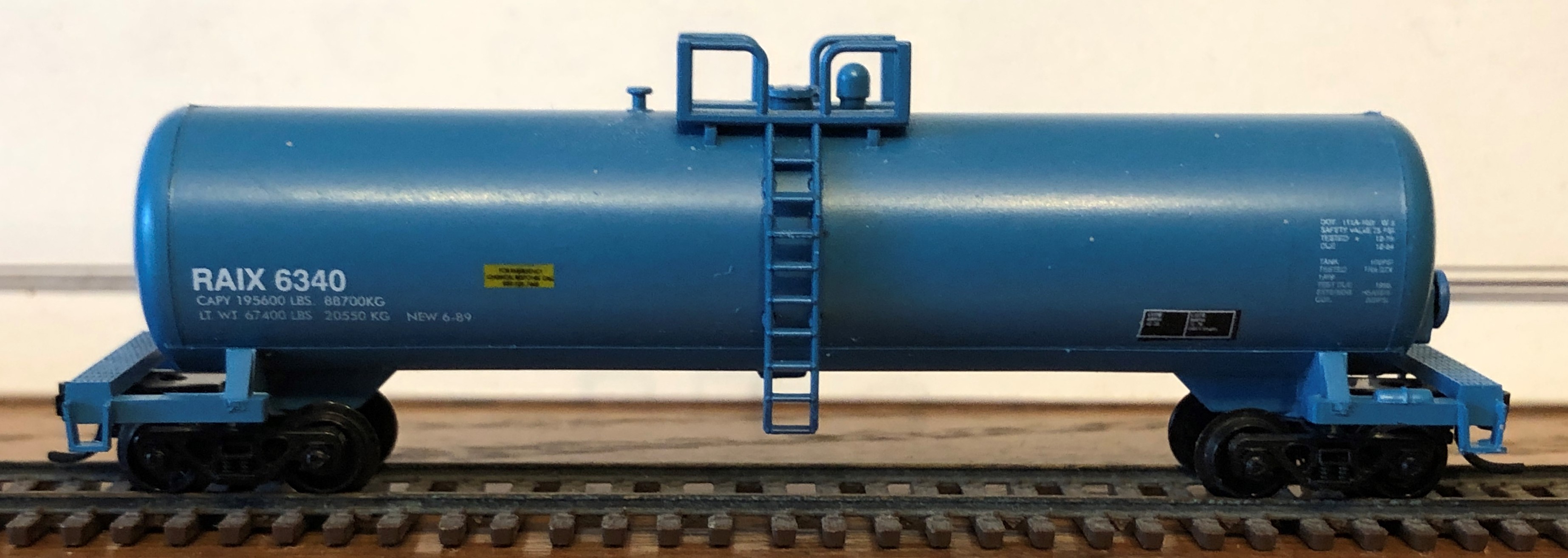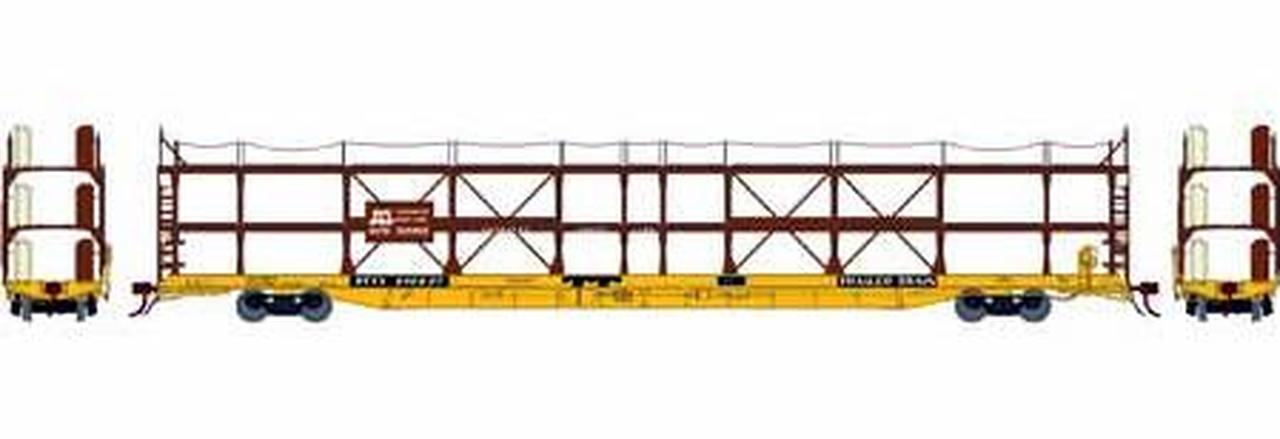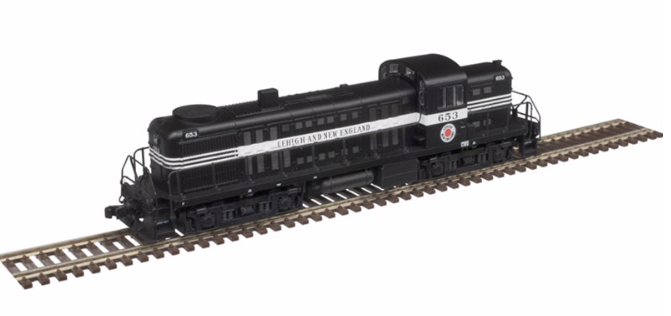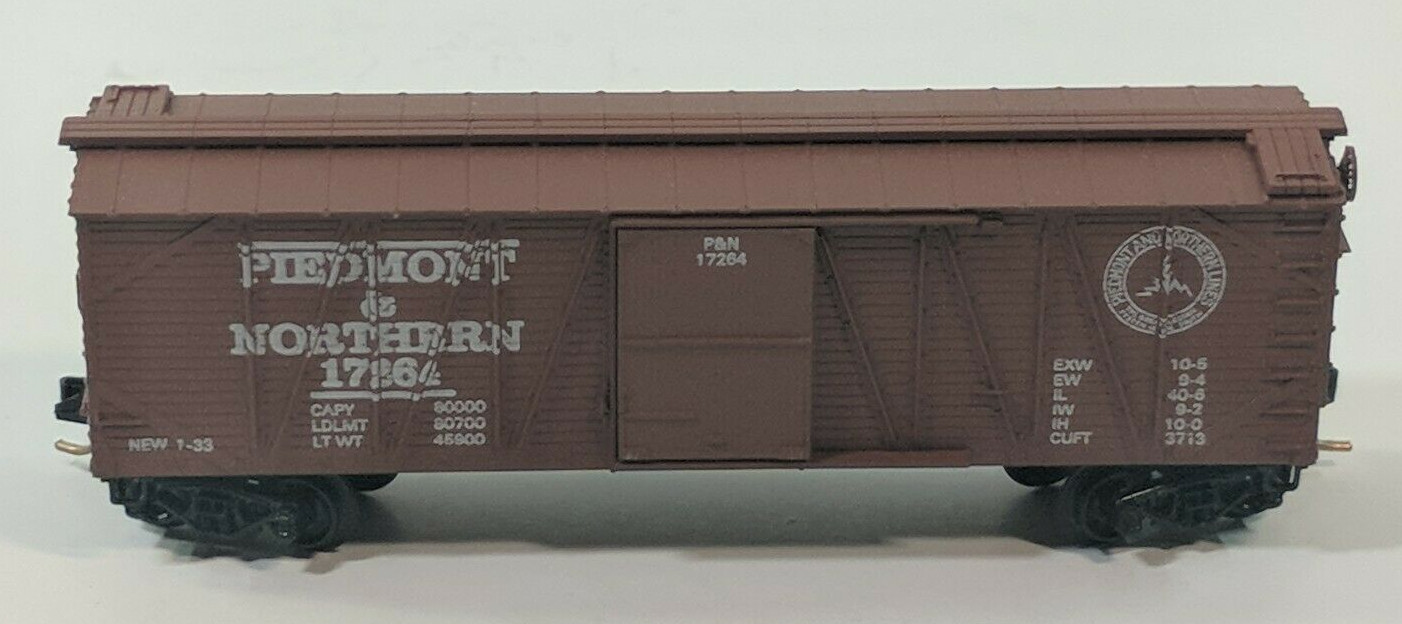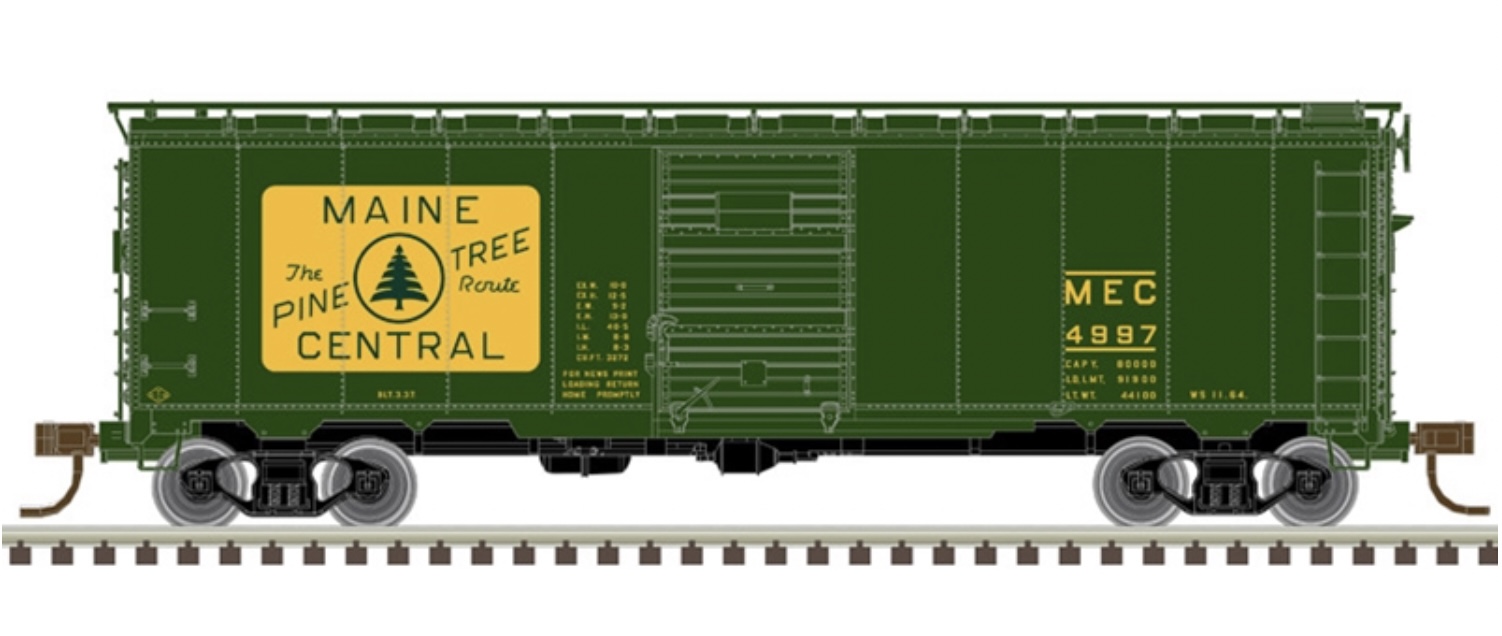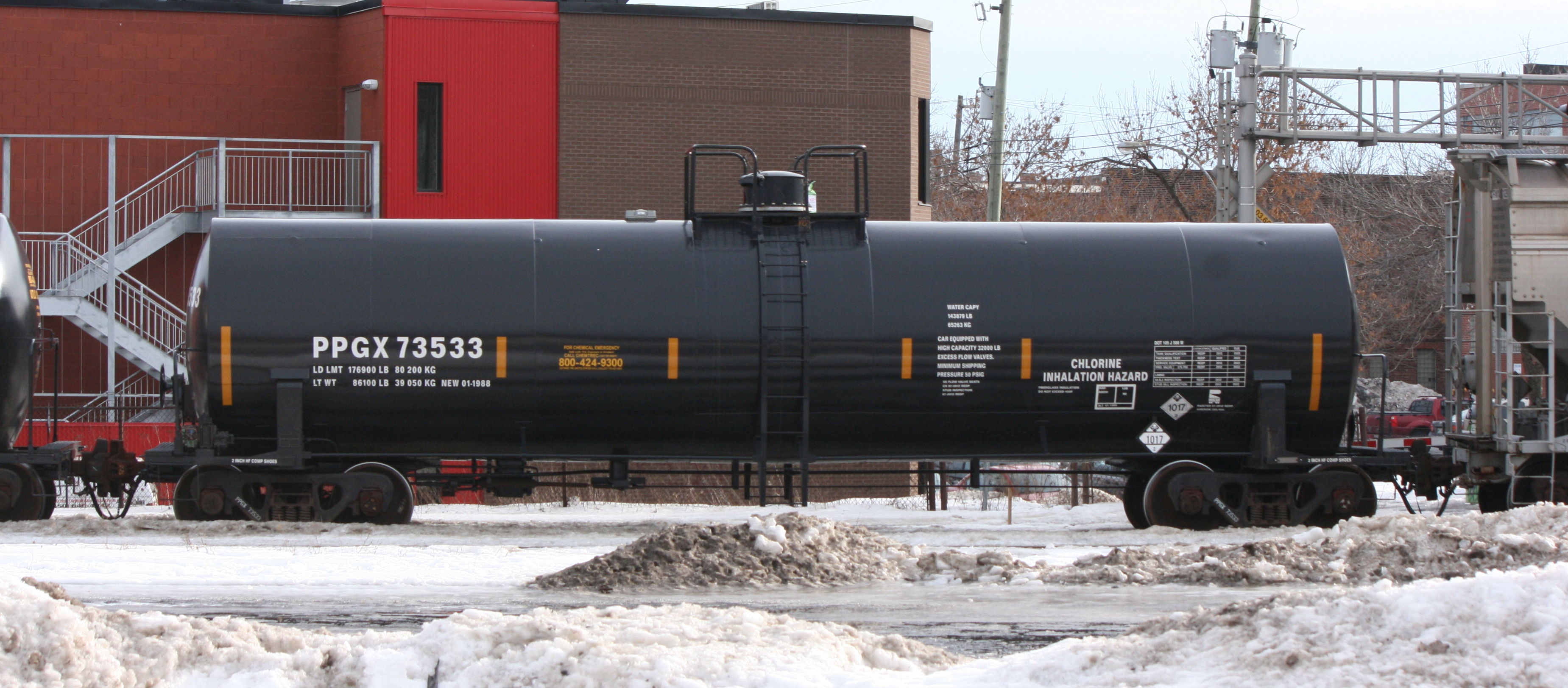Model Information: This is a fairly nice quality tank car from MDC Roundhouse. It likely first appeared in the late 1980s. It appears to model a general service tank car and the road names and paint schemes seem to suggest this is what MDC had in mind. The Roundhouse models were available in both kit and RTR packaging. It doesn't have a ton of detail. Most versions were released with Rapido Couplers so it therefore qualifies as a late 1st generation model. Nevertheless, once the couplers are swapped out, it will look just fine on even the most modern of layouts due to the high print quality and molding on this model. Like all other N Scale toolings made by MDC Roundhouse, this one was acquired by Athearn in 2006. Eastern Seaboard Models has also sold these in custom paint schemes.
Prototype History: Larger, 50' Tank cars replaced their smaller predecessors in the late 1960s and 1970s. The Richmond Tank Car Company was one of several manufacturers to produce these general purpose railcars. They generally had about 20,000 gallon capacity and were used to transport many different commodities.
Road Name History: 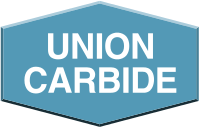 Union Carbide Corporation is a wholly owned subsidiary (since 2001) of Dow Chemical Company. It currently employs more than 2,400 people.[2] Union Carbide produces chemicals and polymers that undergo one or more further conversions by customers before reaching consumers. Some are high-volume commodities and others are specialty products meeting the needs of smaller markets. Markets served include paints and coatings, packaging, wire and cable, household products, personal care, pharmaceuticals, automotive, textiles, agriculture, and oil and gas. The company is a former component of the Dow Jones Industrial Average. Union Carbide was 50.9% stakeholder in Union Carbide India Limited, the company responsible for the Bhopal disaster.
Union Carbide Corporation is a wholly owned subsidiary (since 2001) of Dow Chemical Company. It currently employs more than 2,400 people.[2] Union Carbide produces chemicals and polymers that undergo one or more further conversions by customers before reaching consumers. Some are high-volume commodities and others are specialty products meeting the needs of smaller markets. Markets served include paints and coatings, packaging, wire and cable, household products, personal care, pharmaceuticals, automotive, textiles, agriculture, and oil and gas. The company is a former component of the Dow Jones Industrial Average. Union Carbide was 50.9% stakeholder in Union Carbide India Limited, the company responsible for the Bhopal disaster.
Founded in 1917, the company's researchers developed an economical way to make ethylene from natural gas liquids, such as ethane and propane, giving birth to the modern petrochemical industry. Before divesting them, the chemical giant owned consumer products Eveready and Energizer batteries, Glad bags and wraps, Simoniz car wax, and Prestone antifreeze. The company divested other businesses before being acquired by Dow Chemical on February 6, 2001, including electronic chemicals, polyurethane intermediates, industrial gases and carbon products.
From Wikipedia

Founded in 1917, the company's researchers developed an economical way to make ethylene from natural gas liquids, such as ethane and propane, giving birth to the modern petrochemical industry. Before divesting them, the chemical giant owned consumer products Eveready and Energizer batteries, Glad bags and wraps, Simoniz car wax, and Prestone antifreeze. The company divested other businesses before being acquired by Dow Chemical on February 6, 2001, including electronic chemicals, polyurethane intermediates, industrial gases and carbon products.
From Wikipedia
Brand/Importer Information:  MDC Roundhouse was founded in California in 1938 and relocated in 1993 to Carson City, Nevada due to statewide restrictions on painting. MDC Roundhouse was a producer of both RTR (Ready-to-Run) and kit versions of N Scale rolling stock as well as RTR locomotives. They entered the N scale market in 1979 with a Thrall Hi-Side Gondola and a Hi-Cube Single Door Box Car. MDC Roundhouse was purchased by Horizon Hobbies in June of 2004, when its owner since 1938 C. H. Menteer retired, and merged into their Athearn line.
MDC Roundhouse was founded in California in 1938 and relocated in 1993 to Carson City, Nevada due to statewide restrictions on painting. MDC Roundhouse was a producer of both RTR (Ready-to-Run) and kit versions of N Scale rolling stock as well as RTR locomotives. They entered the N scale market in 1979 with a Thrall Hi-Side Gondola and a Hi-Cube Single Door Box Car. MDC Roundhouse was purchased by Horizon Hobbies in June of 2004, when its owner since 1938 C. H. Menteer retired, and merged into their Athearn line.
Unlike many of their contemporaries which contracted with European firms to produce their products, MDC made their own toolings. They made several popular body styles and produced them for road names that many other vendors (even Micro-Trains) wouldn't touch. This made them popular with modelers. Also, their un-assembled "kits" permitted a lower price point so they were popular with "runners" as well as "modelers".
Of particular interest was the attention given to modern 50 foot steel boxcars. They made some attempt to accurately mold the differences into distinct models to represent each of the major prototype manufacturers products. They have distinct toolings not only for the different products from FMC, BFF and PS, but also multiple models for each of these manufacturers including "standard" vs "Youngstown" doors and "waffle" vs. "rib" sides. In total they produced 13 different versions of the 50 foot steel boxcar.

Unlike many of their contemporaries which contracted with European firms to produce their products, MDC made their own toolings. They made several popular body styles and produced them for road names that many other vendors (even Micro-Trains) wouldn't touch. This made them popular with modelers. Also, their un-assembled "kits" permitted a lower price point so they were popular with "runners" as well as "modelers".
Of particular interest was the attention given to modern 50 foot steel boxcars. They made some attempt to accurately mold the differences into distinct models to represent each of the major prototype manufacturers products. They have distinct toolings not only for the different products from FMC, BFF and PS, but also multiple models for each of these manufacturers including "standard" vs "Youngstown" doors and "waffle" vs. "rib" sides. In total they produced 13 different versions of the 50 foot steel boxcar.
Item created by: gdm on 2016-12-15 17:18:02
Last edited by: dennis.kamper on 2021-08-27 10:50:15
If you see errors or missing data in this entry, please feel free to log in and edit it. Anyone with a Gmail account can log in instantly.
Last edited by: dennis.kamper on 2021-08-27 10:50:15
If you see errors or missing data in this entry, please feel free to log in and edit it. Anyone with a Gmail account can log in instantly.


